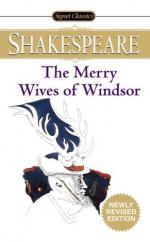|
This section contains 3,709 words (approx. 13 pages at 300 words per page) |

|
SOURCE: "Castrating (W)itches: Impotence and Magic in The Merry Wives of Windsor," in Shakespeare Quarterly, Vol. 38, No. 3, Autumn, 1987, pp. 320-26.
In the following essay, Cotton demonstrates how the women in The Merry Wives of Windsor use deceit to empower their husbands and to render unworthy suitors such as Falstaff impotent.
That sorcery could cause impotence was widely believed in medieval Europe. "By the middle of the twelfth century," according to G. L. Kittredge's history of English witchcraft, "such a condition, thus caused, was an accepted ground for divorce, and for the next three hundred years these cases were so numerous that this species of sorcery became an everyday matter."1 The belief persisted into Shakespeare's day. King James I in the preface to his Daemonologie in 1597 asserts the power of witches to weaken "the nature of some men, to make them unable for women."2 Reginald Scot in The...
|
This section contains 3,709 words (approx. 13 pages at 300 words per page) |

|


